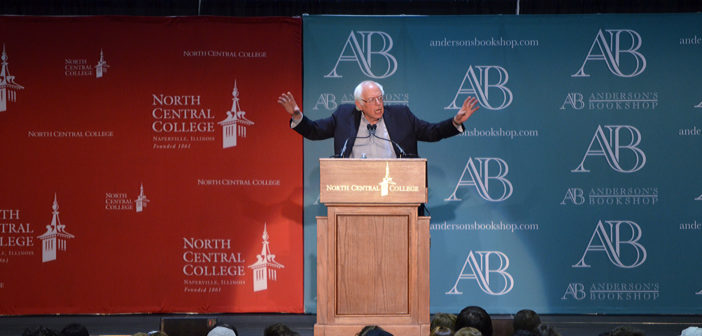On Nov. 18, U.S. Sen. Bernie Sanders came to North Central College to discuss his new book, “Our Revolution.” This was the largest event planned in the country for his book tour, and drew over 3,000 students, faculty and community members who packed into Res/Rec to see him. Not only did Sen. Sanders discuss his new book, but he spent some time talking about the recent outcome of the presidential election.
Before discussing “Our Revolution,” Sanders cited the recent election in order to quell some fears, saying, “Before I talk about the book, there are a few things on my mind, as you might imagine. To begin with, Hillary Clinton will, in the end, have somewhere between 1.5 to 2 million more votes than Donald Trump. He does not have a mandate.”
Sen. Sanders wanted to make it clear to the audience that despite Trump winning the election, the majority of Americans did not support him, according to the popular vote. Instead, he said the majority of Americans care about issues like raising the minimum wage, pay equity for women, lower college tuition, tackling student debt and tax reform in which the wealthiest 1 percent of people pay their fair share.
Upasna Barath, a sophomore majoring in economics, said, “Having a prominent figure like Senator Sanders stand up for your beliefs is so important and so helpful in a time like this where our country is divided and marginalized communities need love and support.”
The first half of “Our Revolution” discusses Sanders’s campaign leading up to the primary election, including their lack of organization in the beginning, and their successes and failures throughout the campaign. The book also touches on the fact that they won 46 percent of the pledged delegates and 22 states despite discouragement and being called a “fringe campaign.”
The second half of the book outlines what Sanders calls “a future to believe in,” a campaign slogan he used from the beginning. According to Sanders, the path to a future to believe in is as follows: defeat oligarchy, implement single-payer healthcare, mend the broken criminal justice system, reform immigration, conquer wealth inequality, and stop corporate media from being a threat to our democracy.
Chelsea Lorenz, a senior majoring in music, said that seeing Sanders on campus helped her realize that what he started is not yet over.
“I skimmed through his new book and I saw things that I believe will help these grassroots revolution keep going,” said Lorenz. “As someone who is scared, I felt that his words of ‘not being privileged enough to lose hope’ got me over the hump of despair.”
During the question-and-answer portion of the event, a question submitted by Chloe Boden, a senior majoring in psychology and sociology, was chosen. Boden asked, “What is your advice to someone who has completely lost hope after the recent election of Trump?”
Sen. Sanders simply said that we do not have the privilege to lose hope. He referenced the civil rights movement, and how hard our brothers and sisters of color had to fight for their rights despite tremendous fear and sadness. According to Sanders, despair will get us nowhere. Instead, he told us to get involved in local politics, organize and come together as an uprising of people who will move this country forward, not backward.
Kevin Oyakawa, president of College Democrats, said, “The event was amazing. When Senator Sanders spoke, he spoke on every issue I hold near and dear to my heart. When Senator Sanders told us that we don’t have the right to sit back and feel bad about ourselves, he was right. I think he said exactly what the campus needed to hear, and that’s to fight for love and true equality.”
As the event came to end, Sanders left the crowd with this simple message: “When the people lead, the leaders will follow.”
Rachel Tucker, a junior majoring in organizational communication and jazz studies, said: “There was something so surreal about actually seeing him and experiencing his words in person. I think he not only gave hope, but most importantly, inspired every person in the audience to step up, get involved and take an active role in politics whether that be running for a position in the city council or joining an advocacy group that goes out and actively contributes to their cause.”

